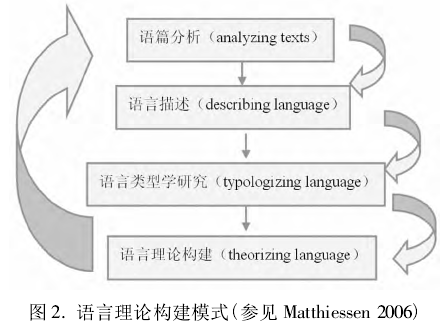4.语篇分析与功能语言学理论构建
Halliday(1978 /2001:36) 曾讨论过语言学的工具性(in-strumentality) 和自治性(autonomy) 属性,他认为这两者之间并不矛盾,具有互补性。自治性语言学研究语言就是理解语言系统,工具性语言学研究语言就是理解别的东西( 比如社会系统)。系统功能语言学研究语言系统和功能,研究语言在社会语境中的问题,“考察语言的使用与社会结构、社会体系的关系,考察语言使用怎样反映特定社会中人与人之间的关系以及语言使用与社会体系之间的相互作用”( 黄国文2010:1-4) ,从功能语篇分析视角研究语言倾向于语言的工具性。
那么语言学研究为什么要进行语篇分析呢? 功能语篇分析单纯是因为系统功能语言学理论操作性比较强? 显然不是。Halliday(2008:192) 指出,功能语篇分析是对语言实例的描述,而实例描述本身就是语言学理论建构的组成部分。系统功能语言学认为语篇分析( 包括语法分析) 不是简单的分析语篇,而是语言学理论构建的重要组成部分。Matthiessen(2006) 把理论构建模式过程分为四个阶段: ( 在语言学理论指导下) 语篇分析→( 基于特定语言理论框架的) 语言描述→( 基于类型学角度的) 语言类型划分→语言理论构建,这四个阶段关系如图2所示:
系统功能语言学作为普通语言学研究语言,其理论体系就是采用以上过程和步骤构建起来的( 参见黄国文2010:1-4; 杨曙、常晨光2013:35-38)。功能语篇分析研究意义( 语义) 是如何通过形式( 词汇语法) 体现,它的最终目的是构建系统功能语言学理论。
5.结语
Matthissen(2007:505-561) 将系统功能语言学理论体系分为不可分割的四个方面: 理论---描述---分析---应用,将语言理论与语言事实相结合,不同于Chomsky的“形式语言学”体系,这表明语言学应用( 语篇分析) 是作为普通语言学的系统功能语言学理论体系中的重要组成。系统功能语言学是语篇分析的理论,功能语篇分析离不开功能语法分析,功能语法分析的原则也是“以意义为导向”( 黄国文2007:39-45) ,功能语篇分析是系统功能语言学理论的一部分。功能语篇分析依赖于系统功能语言学理论,与功能语法分析密不可分,同时又促进系统功能语言学作为“适用语言学”理论的构建和发展。
参考文献:
[1]Eggins,S. An Introduction to Systemic Functional Linguistics(2ndEd.)[M]. New York & London:Continuum,2004.
[2]Firth,J. A synopsis of linguistic theory,1930-1955[A]. In F. R. Palmer(ed.)。 Selected Papers of J. R. Firth 1952-1959[C]. London:Long-mans,1968:168-205.
[3]Halliday,M. A. K. Language as Social Semiotic:The Social Interpretationof Language and Meaning[M]. London / Beijing:Edward Arnold / ForeignLanguage Teaching and Research Press,1978 /2001.
[4]Halliday,M. A. K. Text semantics and clause grammar:How is a text likea clause,1981[A]. In M. A. K. Halliday(ed.)。 On Grammar[C].Volume 1 in The Collected Works of M. A. K. Halliday,Edited by WebsterJ. J. London:Continuum / Beijing:Peking University Press,2002 /2007:219-260.
[5]Halliday,M. A. K. Dimensions of discourse analysis:Grammar,1985[A].In M. A. K. Halliday(ed.)。 On Grammar[C]. Volume 1 in The Collect-ed Works of M. A. K. Halliday,Edited by Webster J. J. London:Continu-um / Beijing:Peking University Press,2002 /2007:261-286.
[6]Halliday,M. A. K. Poetry as scientific discourse:The nuclear sections ofTennyson's In Memoriam,1987[A]. In M. A. K. Halliday(ed.)。 Lin-guistic Studies of Text and Discourse[C]. Volume 2 in The Collected Worksof M. A. K. Halliday,Edited by Webster J. J. London:Continuum / Bei-jing:Peking University Press,2002 /2007:149-167.
[7]Halliday,M. A. K. Some grammatical problems in scientific English,1989[A]. In M. A. K. Halliday(ed.)。 The Language of Science[C]. Vol-ume 5 in The Collected Works of M. A. K. Halliday,Edited by Webster J.J. London:Continuum / Beijing:Peking University Press,2002 /2007:159-180.
[8]Halliday,M. A. K. The construction of knowledge and value in the gram-mar of scientific discourse:With reference to Charles Darwin's The Originof Species,1990[A]. In M. A. K. Halliday(ed.)。 Linguistic Studies ofText and Discourse[C]. Volume 2 in The Collected Works of M. A. K. Hal-liday,Edited by Webster J. J. London:Continuum / Beijing:Peking Uni-versity Press,2002 /2007:168-192.
[9]Halliday,1(2ndEd.)[M]. London:Edward Arnold / Beijing:Foreign Language Teaching andResearch Press,1994 /2000.
[10]Halliday,M. A. K. Things and relations:Regrammaticising experience astechnical language[A]. In J. R. Martin & R. Veel(eds.)。 Reading Sci-ence:Critical and Fundamental Perspectives on Discourses of Science[C].London & New York:Routledge,1998:185-235.
[11]Halliday,M. A. K. The notion of“Context”in language education,1991[A]. In M. A. K. Halliday(ed.)。 Language and Education[C]. Vol-ume 9 in The Collected Works of M. A. K. Halliday,Edited by Webster J.J. London:Continuum / Beijing:Peking University Press,2007:269-290.
[12]Halliday,M. A. K. Complementarity in Language[M]. Beijing:Com-mercial Press,2008.
[13]Halliday,M. A. K. & Hasan,R. Cohesion in English[M]. London:Longman / Beijing:Foreign Language Teaching and Research Press,1976 /2001.
[14]Halliday,M. A. K. & Hasan,R. Language,Context,and Text:Aspectsof Language in a Social-Semiotic Perspective[M]. Geelong:Deakin Uni-versity Press,1985.
[15]Halliday,M. A. K. & Matthiessen,C. M. I. M. An Introduction to Func-tional Grammar(3rdEd.) [M]. London:Arnold,2004.
[16]Martin,J. R. English Text:System and Structure[M]. Amsterdam/Philadelphia:Benjamins Publishing Company / Beijing:Peking UniversityPress,1992 /2004.
[17]Martin,J. Technicality and abstraction:Language for the creation of spe-cialized texts[A]. In M. A. K. Halliday & J. Martin(eds.)。 WritingScience:Literacy and Discoursive Power[C]. London:University of Pitts-burgh Press,1993a:203-220.
[18]Martin,J. Literacy in science:Learning to handle text as technology[A].In M. A. K. Halliday & J. Martin(eds.)。 Writing Science:Literacy andDiscoursive Power[C]. London:University of Pittsburgh Press,1993b:166-202.
[19]Martin,J. & Rose,D. Working with Discourse:Meaning beyond theClause[M]. New York & London:Continuum,2003.
[20]Martin,J. & Rose,D. Genre Relations:Mapping Culture[M]. London:Equinox,2008.
[21]Mattiessen,C. M. I. M. Systemic functional linguistics-appliability areaof research[R]. Keynote Speech Delivered at the First Symposium onFunctional Linguistics and Discourse Analysis,Dec. 10-12,2006,SunYat-sen University,Guangzhou.
[22]Mattiessen,C. M. I. M. The“architecture”of language according to sys-temic functional theory:Development since the 1970s[A]. In Hasan R.,C. M. I. M. Mattiessen & J. Webster(eds.)。 Continuing Discourse onLanguage:A Functional Perspective(Vol. 2) [C]. London:Equinox,2007:505-561.
[23]Mattiessen,C. M. I. M. & Halliday,M. A. K. Systemic Functional Gram-mar:A First Step into the Theory[M]. Beijing:Higher Education Press,2009.
[24]Schiffrin,D. Approaches to Discourse[M]. Oxford:Basil Blackwell,1994.
[25]Sinclair,J. M. Trust the Text:Language,Corpus and Discourse[C]. Lon-don and New York:Routledge,2004.
[26]Ure,J. Lexical density and register differentiation[A]. In G. E. Perren &J. L. M. Trim(eds.)。 Applications of Linguistics:Selected Papers of theSecond International Congress of Applied Linguistics,Cambridge 1969[C].London:Cambridge University Press,1971:75-81.
[27]陈瑜敏,黄国文。马丁的语篇分析观[J].当代外语研究,2010(10) :19-23.
[28]常晨光,廖海青。系统功能语言学理论与实践的辩证关系[J].外语与外语教学,2010(5) :11-14.
[29]韩礼德。篇章、语篇、信息---系统功能语言学视角[J].北京大学学报( 哲学社会科学版) ,2011(1) :137-146.
[30]黄国文。功能语篇分析纵横谈[J].外语与外语教学,2001(12) :1-4.
[31]黄国文。功能语篇分析面面观[J].国外外语教学,2002(4) :25-32.
[32]黄国文。系统功能语法分析的目的和原则[J].外语学刊,2007(3) :39-45.
[33]黄国文。语篇分析与系统功能语言学理论的建构[J].外语与外语教学,2010(5) :1-4.
[34]彭 静。功能语言学视角下教师课堂话语意识研究[J].西安外国语大学学报,2015(2) :70-73.
[35]杨 曙,常晨光。系统功能类型学---类型学之功能视角[J].外语与外语教学,2013(4) :35-38.
[36]杨信彰。英语科技语篇和科普语篇中的词汇语法[J].外语教学,2011(4) :18-21.
